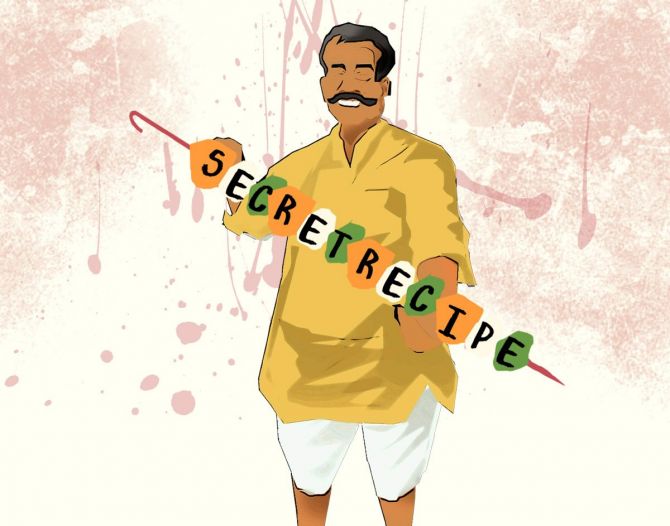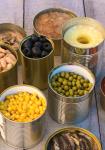Who owns a recipe, and should one fight over its origins?

Culinary authenticity has long been debated. What people eat offers a window to their culture.
Food is an important medium for tracing and navigating the threads of tradition.
The 'correct' tadka (tempering with whole spices) has been hotly debated -- from college canteens to newsrooms. But what is an 'authentic' recipe?
The widely-loved butter chicken, for instance, has recently made headlines due to a lawsuit over its origins, with two Delhi-based restaurants claiming to be its creators.
Both Moti Mahal, which was set up by Kundan Lal Gujral, and Daryaganj, founded by Kundan Lal Jaggi, assert that they were the inventors of the dish.
While it is now up to the Delhi high court to settle the matter, the memories of butter chicken on my palate have been different.
The North Indian staple is sweet and tangy, but the butter chicken I grew up eating in Kolkata boasts a smoky, savoury, creamy, makhani (buttery) gravy.
The influence of the Awadhi style of cooking is unmissable.
Potatoes, meanwhile, have held their ground, especially in the debate over biryani.
Celebrity chef Ranveer Brar debunked the myth that the humble aloo was added to flavourful rice and meat due to the lack of availability of the latter during Wajid Ali Shah's exile in Calcutta.
The 'truth' was the tuber was considered a novelty in India as it was a Portuguese import.
Although not as costly as meat, the potato soaks up all the flavour of the saalan(gravy), therefore adding depth to the dish while regulating the cost.
Potatoes have found their way to most recipes in Bengal. In Rajasthan's meat-eating communities, potatoes are added to gosht to increase the quantity and hence feed more mouths.
What is on our plate is often political. Journalist and food blogger Shoaib Daniyal in a podcast interview with satirist and content creator Anurag, The Philosophy of Food, mentions how there is no original or rightful recipe.
He describes how ingredients are tweaked in different households every 100 metres, thereby completely altering the idea that there exists one singular definition of how one's favourite dish looks, smells, and tastes.
Recipes vary based on the availability of resources, time, geography and one's religion.
What goes into our food is also decided based on our standing in society.
I recently became cognizant that adding salt to white rice -- a concept alien to me -- inherently signifies hierarchy in society.
Salt adds depth and flavour to the rice itself without requiring a lot of accompaniments, which remain inaccessible to marginalised communities.
Sections of our society have been penalised for their choice of food as it goes against the idea of 'purity'.
At IIT-Bombay, where dining areas are segregated for vegetarian and non-vegetarian eaters, a group of students staged a symbolic protest in September last year by eating non-vegetarian meals at tables 'reserved' for vegetarians. The students were fined for this 'indiscretion'.
The debate over the acceptability of food also extends to Halal certification.
Muslim bodies have denounced the UP government's recent move to ban the storage and sale of Halal-certified products, saying it infringes upon one's right to eat what is permissible by faith.
Food has always been a source of contention in India. However, more people are eating non-vegetarian food than before.
According to the National Family Health Survey-5, in the 15 to 49 age group, 83.4 per cent of men and 70.6 per cent of women eat non-vegetarian food either daily or occasionally. But historically, meat eaters have faced reprimand, with utensils segregated to prevent contact, and the prohibition of cow slaughter has sparked crimes rooted in faith and politics.
The Karnataka government also recently found itself in a soup when the distribution of eggs in school mid-day meals became a subject of intense debate among politicians and teachers.
The students, however, made their own choice. According to a report in The Indian Express, around 80 per cent of the midday meal beneficiaries chose eggs over the alternatives -- bananas and chikki.
Some are trying to bridge the divide. An interactive performance, Come Eat With Me, by Bengaluru-based theatre artiste Sri Vamsi Matta explores identity through the relationship of caste with food.
The audience is invited to sit and unpack their experiences while sharing a meal.
It aims to reiterate that food isn't homogenous and by sharing a plate many orthodoxies can be done away with.
This may have a lesson for Bengal and Odisha as they battle over the origin of rasgulla.
Clearly, refraining from getting entangled in such sweet conflicts is the best way forward.
Feature Presentation: Rajesh Alva/Rediff.com












